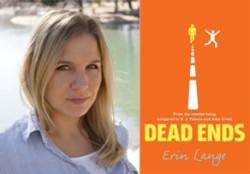Writing from the perspective of a bully
Published on: 30 June 2014 Author: Erin Lange
Erin Lange, author of Dead Ends, writes about the 'R' word, and what it's like to write a book from the perspective of a bully, especially having been a victim of bullying herself.

The 'R' word
This article begins much the same way my new book, Dead Ends, began... with the 'R' word. When I decided to write a story about the friendship between a bully and a boy with Down Syndrome, I knew one of these characters had serious obstacles to overcome... and it wasn't the boy with Down Syndrome.
In order to let my bully grow, I had to start him off a few paces behind - had to allow him to be a bit of a bad guy in the beginning.
For me, that meant letting him use the word 'retard'. I detest that word so much, I struggled to type it just now - much like I struggled with including it in my early manuscript drafts. But that word became essential to the story in Dead Ends. The bully, Dane, evolves throughout the book, and you can trace his evolution, in part, by how he uses - and then hesitates to use - that word, until he eliminates it entirely from his vocabulary.
The bully
From the outset of the story, Dane has 'standards' that include not picking fights with people who are disabled.
He thinks this sets him apart from the average thug, and he even shows scorn for anyone who treats his new friend, Billy D., better or worse than anyone else because of his disability. But Billy D. quickly - and frequently - gives Dane a reality check like this one:
'I took a breath. 'People shouldn't treat you different just because you look retar-' I choked on the word. 'Because you're - whatever - challenged or something.'
Billy stopped. We'd reached our houses. 'You treated me different,' he said.
'What? No, I didn't.'
'Yeah, you said you wouldn't beat me up - because of how I look, right?'
There are bullies in the book who are beyond the pale, who call Billy D. atrocious and offensive names and show no 'standards' of their own, but characters who are pure evil are hard to relate to. I wanted readers to recognize something of themselves in Dane... to show that even people with the best intentions can make some very common mistakes, such as accidentally using language that we think is politically correct but is actually offensive.
Being a victim of bullying
Once upon a time, it would have been all too easy for me to write about one of those 'pure evil' bullies, because that's how I viewed all of them back when I was a victim of bullying myself. I'll spare you my own childhood experience with cruelty and instead tell you a story about an encounter I had with one of my bullies years later, as an adult.
I was home from college on a holiday break, hanging out at my favorite coffee shop, when I spotted a face I hadn't seen since I was 13 years old - the face of one of the girls who had tormented me. I accidentally made eye contact, and to my horror, she started pushing through the crowd of people to get to me. I froze, feeling like that 13-year-old girl again. I had no idea what to expect. But I didn't expect this:
'I'm sorry for the way we all treated you back then.'
It's more complicated than good guys and bad guys
It was the first thing out of her mouth, right after she said her name and asked if I remembered her. And the truth is... it made me furious. All I'd had when I'd walked away from the school where I'd been bullied was this sense of righteous anger - this black-and-white certainty that I was the good guy and they were the bad guys. But if this girl could show remorse, then maybe she wasn't 100 per cent evil, which meant my anger wasn't 100 per cent righteous.
I couldn't wrap my brain around the idea that the villains in my own personal story might be more complicated than I'd made them out to be, so I said something extremely clever, like, 'Uh, okay.' Then I went and hid in the bathroom until she went away. Much, much, much later I realized I had squandered a really rare opportunity when I failed to accept her apology.
So today, I forgive her in the best way I know how, which is to be fair to the bullies in my books - to paint them in shades of gray and - in the case of Dead Ends - to show how they can ultimately be redeemed.
It was that journey of redemption that was the ultimate goal of the book, and it pleases me to no end when I hear from readers who pick up the book thinking it will be the story of a boy with Down Syndrome's 'triumph over adversity' and discover it's the bully who has something to overcome.
Read our recommended books on bullying, acceptance and celebrating difference.
Topics: Disability, Down’s Syndrome, Bullying, Personal/social issues, Features






Add a comment